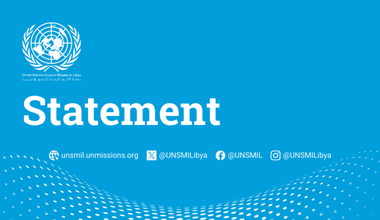Economic Working Group Discusses Plan to Address Electricity Crisis with Libyan Electricity Company Leadership
Tunis - On 23 September, Acting UN SRSG Stephanie Williams and the Ambassador-designate of the European Union to Libya, José Sabadell, as the rotating chair of the Economic Working Group (EWG) established by the Berlin Process, convened a meeting with the new leadership of the General Electricity Company of Libya (GECOL) to discuss plans to address the unacceptable electricity crisis in the context of the Libyan efforts to reopen the energy sector. Libyans across the country have been facing daily acute power outages, sometimes lasting 16 hours per day or more.
The Deputy Chairman of GECOL, Abdul Salem al Ansari, presented a plan to address the current 3,000 MW deficit with short-term and long-term lines of efforts. Al Ansari identified conducting maintenance and maintaining grid stability as the key short-term lines of effort, noting that the latter was complicated by the difficulty in implementing an effective load shedding schedule. He noted damage to the GECOL operating room and the inoperability of a main transmission cable as contributing to power outages in Tripoli. Al Ansari stated that revenue flows to GECOL from tariff collection were near zero and that collection needed to improve if the company was to become viable.
The meeting with the GECOL leadership was attended by more than forty members of the diplomatic community to Libya including representatives of the Egypt, Italy, France, Germany, the Netherlands, Tunisia, Turkey, the United Arab Emirates, the United Kingdom, the United States, the League of Arab States and the African Union. Several Libyan economic experts from the Libyan Economic Expert Dialogue also participated and provided advice and suggestions as to how to implement structural reforms.
EWG participants expressed concern about the deteriorating situation and committed to support GECOL in addressing the electricity crisis. Prioritizing vital maintenance, improving involvement by the private sector including in renewable energy, and enhancing cooperation with neighbouring states were viewed as areas where support could be enhanced.
 United Nations Peacekeeping
United Nations Peacekeeping UN
UN









